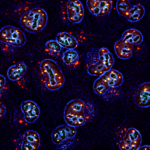Lien vers Pubmed [PMID] – 11704852
Oncogene 2001 Oct;20(49):7243-9
SUMO belongs to a growing number of ubiquitin-like proteins that covalently modify their target proteins. Although some evidence supports a role of SUMO modification in regulating protein stability, most studied examples support a model by which SUMO alters the interaction properties of its targets, often affecting their subcellular localization behavior. Examination of the PML nuclear bodies, whose principal components are SUMO-modified, has revealed this modification to be essential for their structural and functional integrity. This and other examples thus support the view that SUMO regulates the stability not of individual proteins, but rather that of entire multiprotein complexes.

